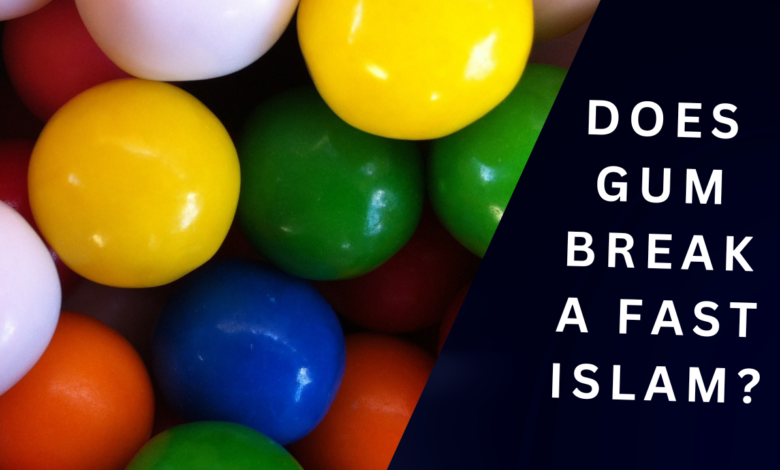Does Gum Break a Fast Islam?
Understanding the Ruling on Chewing Gum During Ramadan

Does Gum Break a Fast Islam?
The ruling on chewing gum during fasting varies among Islamic scholars. Some consider it as potentially breaking the fast, while others view it differently. It’s essential to consult with a knowledgeable scholar for specific guidance.

Introduction
Ramadan, the ninth month of the Islamic lunar calendar, is a sacred and spiritually significant time for Muslims around the world. During this holy month, Muslims fast from dawn until sunset, refraining from eating, drinking, and other physical needs. Fasting in Ramadan is one of the Five Pillars of Islam, and it serves as a means of spiritual purification, self-discipline, and a way to draw closer to God. While the rules for fasting are clear, some questions arise about what does and does not break the fast. One common question is, “Does chewing gum break a fast in Islam?” In this article, we will explore the different opinions and rulings on this matter.
The Basic Principles of Fasting in Islam
Before we delve into whether chewing gum breaks a fast, it is essential to understand the fundamental principles of fasting in Islam. Fasting in Ramadan requires abstaining from food, drink, and intimate relations during daylight hours. The intention, or niyyah, is crucial before beginning the fast. Breaking the fast intentionally without a valid reason, such as illness or pregnancy, invalidates the fast.
Also check.
- Which types of Relations are Haram in Islam?
- What is Islam and Iman?
- What is Indo Islamic Culture?
- What is in Heaven Islam?
- What is a Eid?
Chewing Gum and Fasting
Chewing gum is a unique issue when it comes to fasting. Unlike food and drink, it does not provide nourishment or sustenance to the body. Nevertheless, scholars have differing opinions on whether chewing gum breaks a fast in Islam. Let’s explore some of the key arguments on both sides:
- Chewing Gum as Food: Some scholars argue that chewing gum should be considered as food since it contains calories and flavor. This perspective maintains that anything with caloric content disrupts the fast. From this viewpoint, chewing gum would indeed break the fast.
- Chewing Gum as Medicine: On the other hand, some scholars argue that chewing gum, like medications, is not considered food. If a person uses gum for medicinal purposes, such as to alleviate bad breath or a dry mouth, it would not break the fast.
- Chewing Gum as a Mindless Habit: Another perspective suggests that fasting is not just about refraining from physical consumption but also controlling one’s behavior. Chewing gum, when done without thinking and without the intention to consume anything, may not invalidate the fast.
- The Safest Approach: Given the differing opinions, some Muslims prefer to avoid chewing gum during their fasts to ensure that they do not unintentionally invalidate their fast. This approach aligns with the principle of exercising caution in matters of worship.
Scholarly Opinions
The diversity of opinions among Islamic scholars on whether chewing gum breaks a fast highlights the complexity of this issue. Different schools of thought within Islam may have varying interpretations, and individual scholars may have their own perspective. Therefore, it is essential for individuals to consult a trusted religious authority or scholar who can provide guidance based on their specific circumstances and beliefs.
Conclusion
The question of whether chewing gum breaks a fast in Islam is a matter of debate among scholars and Islamic jurists. As with many aspects of religious practice, individual interpretation and understanding can vary. To make an informed decision, it is advisable for Muslims to consult with knowledgeable scholars or religious authorities who can provide guidance tailored to their specific circumstances and beliefs.
In the spirit of Ramadan, Muslims should focus on the spiritual and moral aspects of fasting, striving to attain self-discipline, increased piety, and closeness to God. While it’s important to adhere to the rules of fasting, the intention and the effort to fulfill one’s religious duties are equally crucial. Regardless of one’s stance on chewing gum, the overarching goal of fasting in Islam should always be to strengthen one’s faith and character.

FAQs
Does chewing gum break a fast in Islam?
The ruling on chewing gum during fasting varies among Islamic scholars. Some consider it as potentially breaking the fast, while others view it differently. It’s essential to consult with a knowledgeable scholar for specific guidance.
What are the main arguments for gum breaking a fast?
Some argue that gum contains calories and flavor, which could be considered as consuming something, thus breaking the fast.
Are there any circumstances where chewing gum is allowed during fasting?
In some cases, scholars permit gum for medicinal purposes, like alleviating bad breath or a dry mouth. However, it is crucial to consult a scholar for individual guidance.
Can I chew gum without any intention of consuming it during my fast?
Some scholars consider the intention behind chewing gum. If you are not intending to consume anything and it’s more of a mindless habit, it might not invalidate your fast. However, opinions on this matter may differ.
Which school of thought has the most lenient or strict view on chewing gum during fasting?
Different schools of thought in Islam have varying interpretations of this issue. It’s advisable to consult scholars from your own school of thought for guidance.
Should I avoid chewing gum during fasting to be on the safe side?
To ensure that you do not unintentionally invalidate your fast, many Muslims prefer to avoid chewing gum during their fasting hours. This aligns with the principle of exercising caution in religious matters.
Can I get a fatwa (religious ruling) on chewing gum during fasting online?
You can seek guidance from reputable Islamic scholars and organizations online. However, for specific and personalized fatwas, it’s best to consult with a local scholar who is familiar with your circumstances.
Where can I find more information about fasting and Islamic rulings?
Mosques, Islamic centers, and reputable online resources provide valuable information about Islamic fasting rules. Consult with local scholars for guidance tailored to your specific situation.




